The First List of Chinese AI Academic Influence Released – Top100 of 2018!
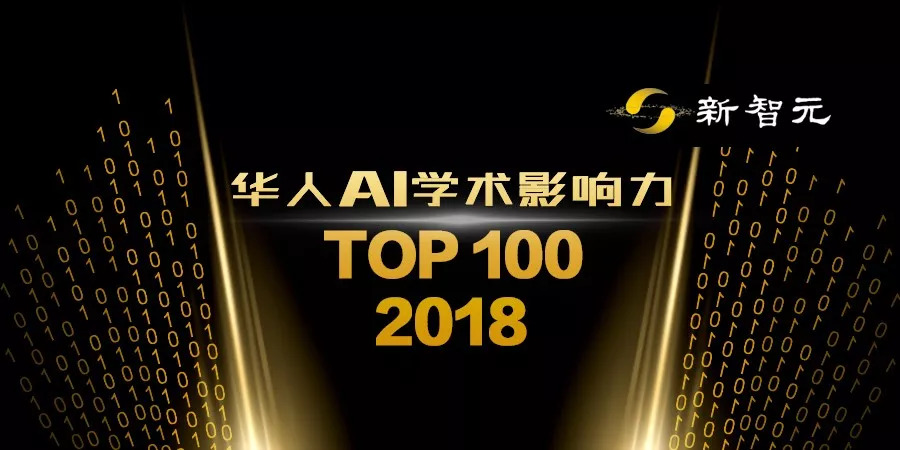
Xinzhiyuan AI WORLD – 2018 Global AI Summit
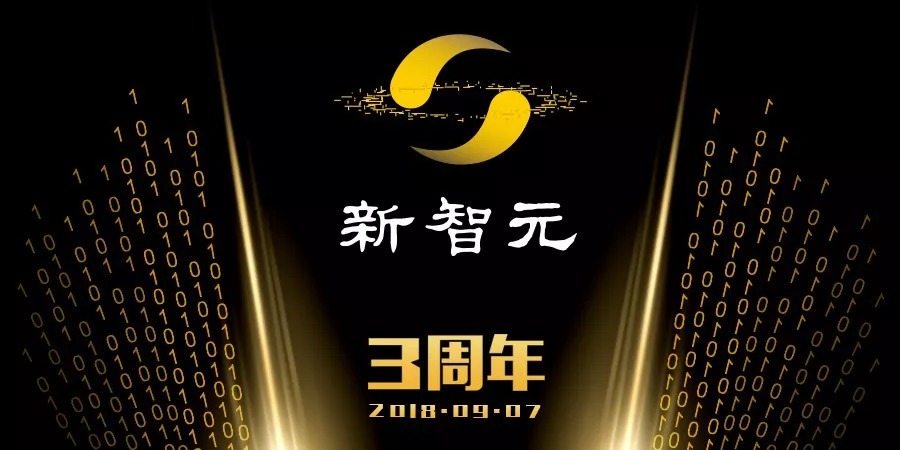
On the third anniversary of its launch, Xin Zhiyuan Starship officially announced the results of its exploration today.
The world’s first Chinese AI academic influence list has been released, with a hundred young and middle-aged AI scholars selected!
As the first academic list worldwide to do quantitative research on the academic achievements of Chinese scholars in AI field, “2018 Chinese AI Academic Influence Top 100” focuses on researchers, promoters and academic pioneers who explore innovations of AI theories and applications. Through listing the most influential 100 academics among Chinese scholars who have promoted the development of AI around the globe, it records the splendid academic achievements in the field of AI.
The 2018 Academic Impact TOP 100 evaluation system is based on the recommendations of Tsinghua Science and Technology University’s Big Data Center. It uses 100% quantitative data to evaluate academic indicators, screens the results with the AI knowledge map of the Aminer team of Tsinghua Science and Technology Big Data Center, ranks them and screens the final results.

According to the AI knowledge map, Xinzhiyuan explores and analyzes important scholars in the important sub-areas of AI.
Based on the overall academic performance of the past five years, Xinzhiyuan has selected a hundred Chinese AI scholars under the age of 45 worldwide to continue promoting the exploration and pursuit of original theories in the Chinese AI academic community.
The following is a brief introduction to the top 20 Chinese AI scholars:
Zhou Zhihua
Zhou Zhihua is the director of the Department of Computer Science at Nanjing University and the dean of the Institute of AI. He mainly engages in research work in the fields of AI, machine learning, data digging, etc. He is currently the Director of the Department of Computer Science and Technology of Nanjing University, the Executive Deputy Director of the National Key Laboratory of Computer Software New Technology of Nanjing University, and the Director of the Institute of Machine Learning and Data Mining (LAMDA). ACM, AAAS, AAAI, IEEE, IAPR, International Society of Engineering and Technology (IET/IEE), Chinese Computer Society (CCF), Chinese Society of Artificial Intelligence (CAAI) and other members of the Fellow (Fellow), foreign academician of the European Academy of Sciences.
Tao Dacheng
Tao Dacheng is currently a professor at the School of Engineering and Information Technology at the University of Sydney. He is the director of the AI Center at the University of Sydney and the chief scientist of AI. He is an IEEE Fellow, AAAS Fellow, OSA Fellow, IAPR Fellow, SPIE Fellow, Fellow of the European Academy of Sciences and Fellow of the Australian Academy of Sciences. He has obtained bachelor’s, master’s and doctoral degrees from the University of Science and Technology, Hong Kong and the University of London. The main research direction is to characterize learning, including multi-view learning, multi-label learning, multi-task learning, and migration learning. He has published more than 500 papers in authoritative magazines and important conferences, and has won several best paper awards.
Sun Jian
Sun Jian, defied chief technology scientist, dean of the institute, and former researcher of Microsoft Research Asia. His main research interests are image understanding based on deep learning, face recognition and computational photography. Since 2002, he has published 100+ academic papers in CVPR, ICCV, ECCV, SIGGRAPH, PAMI five top academic conferences and journals, Google Scholar cited 40,000+ times, H-index 70, and twice won the CVPR Best Paper Award. In 2015, Sun Jian led the team to win five championships in the Image Recognition International Competition. The team developed the “Deep Residual Network-ResNet” and the “Fast RCNN based on regional convolutional neural network” technology. It is currently widely used in academic and industrial circles. In 2016, Dr. Sun Jian won the second prize of the National Natural Science of the People’s Republic of China. In 2017, Sun Jian led the contempt technology team to win three championships in the COCO & Places Image Understanding International Competition.
Xie Xing
Xie Xing, Senior Research Fellow at Microsoft Research Asia, a part-time doctoral tutor at the University of Science and Technology of China. His team conducts innovative research in areas such as data mining, social computing, and pervasive computing. He has published more than 200 academic papers in international conferences and academic journals, and has been cited more than 18,000 times. He has won many best paper awards at top conferences such as KDD and ICDM. He is an ACM, IEEE Senior Member and Distinguished Member of the Computer Society. He has served as co-chair of the Program Committee of ACM UbiComp 2011, PCC 2012, IEEE UIC 2015, and SMP 2017.
Ning Peng
Ning Peng, senior vice president of Samsung Electronics and head of Samsung Mobile B2B service team, Samsung KNOX (Enterprise Mobile Security Platform) and Samsung Pay (Worldwide) co-director of Samsung Pay. He is also the head of the Security and Service Lab at the Samsung Electronics USA Institute, where he oversees the development of Knox, DeX, Samsung Zhifu and Samsung Health in the United States. Prior to joining Samsung in 2012, Ning Peng was a professor of computer science at North Carolina State University. He is a NSF CAREER Award winner, a member of the Steering Committee of ACM CCS and ACM WiSec, and serves as Chairman of more than 70 technical conferences or seminars, organizations or program committees related to computers and technology.
Tao Yufei
Tao Yufei is a professor and doctoral supervisor at the Chinese University of Hong Kong. In 2002, he obtained a Ph.D. in computer science from the Hong Kong University of Science and Technology. In the same year, he won the first “Young Scientist Award” in Hong Kong. In 2003, he was a postdoctoral fellow at Carnegie Mellon University in the United States. He then served as an assistant professor at the City University of Hong Kong and the Chinese University of Hong Kong for 3 years. In September, he was promoted to a professor and doctoral tutor at the Chinese University of Hong Kong, becoming the youngest professor in Hong Kong universities at that time.
Tian Qi
Tian Qi, IEEE Fellow, professor of computer science at the University of Texas at San Antonio, and professor of education, Professor Jiang, joined the Huawei Noah’s Ark Laboratory in July 2018 as the chief scientist of computational vision. Professor Tian Qi graduated from the Department of Electronic Engineering of Tsinghua University in his early years and went to the University of Illinois at Urbana-Champaign. He studied under the leadership of Professor Thomas S. Huang, the father of computational vision. He was a full-time professor of computer science at the University of Texas at San Antonio, and was selected to the Google Research Grant Program in 2010. He was awarded the UTSA President’s Distinguished Research Award in 2017 (one per year). In 2016, he was recognized as one of the top 10 most influential in the multimedia field. scholar.
Hua Xiansheng
Hua Xiansheng, Vice President of Alibaba, Deputy Director of Machine Intelligence Lab of Dharma Institute, IEEE Fellow, ACM Distinguished Scientist. In 2008, he received the TR35 Award from the Massachusetts Institute of Technology. In 1996 and 2001, he obtained bachelor’s and doctoral degrees in applied mathematics from Peking University. At the beginning of 2016, he joined iDST, Alibaba’s core research and development center, to create a visual computing team responsible for the intelligent analysis, identification, search, generation and mining of large-scale video images on the cloud, including the city brain. Dr. Hua will be the chairman of the ACM Multimedia 2020 conference, the premier international conference in the multimedia field.
Nie Feiping
Nie Feiping, professor and doctoral supervisor at Northwestern Polytechnical University. He graduated from the Department of Automation of Tsinghua University with a Ph.D. From 2008 to 2009, he worked as a research assistant at Nanyang Technological University in Singapore, and then as a research assistant professor, research associate professor and research professor at the University of Texas at Arlington. In 2015, he was selected into the Youth One of the Group. He has published more than 100 academic papers in international top journals and conferences such as PAMI, IJCV, Bioinformatics, IJCAI, AAAI, ICML, NIPS, SIGKDD, CVPR, and ICCV.
Ma Yi
Ma Yi is a professor in the Department of Electrical Engineering and Computer Science at the University of California at Berkeley. In 1995, he obtained a bachelor’s degree in automatic chemistry from Tsinghua University and a minor in applied mathematics. In 1997, he received a master’s degree in electrical engineering and computer science from Berkeley. In 2000, he received a master’s degree in mathematics from Berkeley and a doctorate in electrical engineering and computer science. From 2000 to 2011, he taught at the University of Illinois at Urbana-Champaign. From 2009 to 2013, he served as Director and Principal Investigator of the Computer Imaging Group at Microsoft Research. From 2014 to 2017, he was the founding professor and executive dean of the School of Information Science and Technology of Shanghai University of Science and Technology. Joined Berkeley in 2018.
Xu Changsheng
Xu Changsheng, Research Fellow, State Key Laboratory of Pattern Recognition, Institute of Automation, Chinese Academy of Sciences, Ph.D. Supervisor, Executive Dean of China-Singapore Digital Media Research Institute. He received his Ph.D. degree in engineering from Tsinghua University in 1996, and then joined the postdoctoral and associate research fellow of the Institute of Automation of the Chinese Academy of Sciences. From 1998 to 2008, he was a researcher and project leader and director of the media analysis laboratory at the Singapore Institute of Information and Communications. In 2001, he was a researcher at the University of Sydney’s computer department. In 2008, he joined the Institute of Automation of the Chinese Academy of Sciences. His research interests include multimedia analysis and retrieval, computer vision, and pattern recognition.
Cai Deng
Cai Deng is a professor at the School of Computer Science of Zhejiang University, a Ph.D., a recipient of the National Outstanding Youth Fund, a young talented person in the 10,000-person program, and a chief scientist in the youth 973. The main research direction is machine learning. In recent years, he has published more than 130 academic papers in international top academic conferences and journals in the field of artificial intelligence and computer vision, citing more than 15,000 times and H index 53. Member of the AAAI 2017 and IJCAI 2017 Senior Program Committee. Received the Best Paper Award at the 2012 International Artificial Wisdom Annual Conference.
Zheng Yu
Zheng Yu is currently the vice president of Jingdong Finance, the chief data scientist, and the general manager of the Urban Computing Division. He is responsible for the JD financial city computing business. Prior to joining JD Finance, Dr. Zheng Yu was the head of the urban computing field at Microsoft Research Asia. He proposed the concept of “urban computing” and was a pioneer and founder in the field of urban computing. He has published more than 100 high-quality international papers, many of which have become the foundational papers in the field of urban computing. In 2013, he won the TR35 Award from the Massachusetts Institute of Technology Science and Technology Review. In 2014, it was named as China’s 40 business elites under 40 years old by Fortune.
Tang Jie
Tang Jie, deputy director of the Department of Computer Science and Technology, Tsinghua University, associate professor, IEEE senior member, ACM senior member, CCF outstanding member. Tsinghua University – Director of the Joint Research Center for Knowledge and Intelligence of the Chinese Academy of Engineering, Executive Director of the Center for Scientific Data Research at the Institute of Data Science, Tsinghua University, and Head of the Knowledge Engineering Laboratory (KEG) at Tsinghua University. In 2006, he received his Ph.D. degree from the Department of Science and Technology of Tsinghua University. In the same year, he was elected to ACM Professional Member. In 2007, he was an IEEE member. In 2015, he was an outstanding member of CCF. His main research interests include social networking theory, data mining methodology, machine learning algorithms, and semantic network technologies.
Wang Meng
Wang Meng is a professor at Hefei University of Technology, a doctoral tutor, a member of the Academic Committee of Hefei University of Technology, and the chairman of the Anhui Artificial Intelligence Society. Research field: Multimedia information processing, published more than 150 papers in his research field. Member of the Steering Committee of the International Multimedia Modeling Conference of the CCF Recommendation Conference. In 2015, he won the second prize of the National Natural Science (third finisher). In 2016, he was selected as a young scholar of the “Yangtze Scholar” award program of the Ministry of Education and the winner of the 2017 National Science Fund for Distinguished Young Scholars.
Yang Yi
Yang Yi is a professor at the School of Engineering and Information Technology at the University of Technology, Sydney. In 2010, he obtained a Ph.D. in computer science from Zhejiang University. In 2011, he went to CMU Computer Science College as a postdoctoral researcher. Since 2015, he has been a member of the University of Technology, Sydney. Since December of the same year, he has served as deputy director of the Institute of Software Science (Scientific Research) at the University of Technology, Sydney, Australia. Since April 2017, he has been a professor at the School of Engineering and Information Technology at the University of Technology, Sydney. His main research areas are computer vision, artificial intelligence and multimedia technology. Honors include the 2013 Australian Research Council Young Scholars Discovery Award, the 2015 Zhejiang Science Awards, and the 2017 Google Research Grant Program.
Chen Lei
Chen Lei is a professor in the Department of Computer Science and Engineering at the Hong Kong University of Science and Technology. He received a bachelor’s degree in computer science from Tianjin University in 1994 and a master’s degree in computer science from the Asian Institute of Technology (AIT) and the University of Waterloo, Canada. His research interests include data-driven machine learning, crowdsourced data processing, non-deterministic and probabilistic databases, privacy-protected data publishing, network information management, and multimedia systems. In 2013, he was selected into the Google Research Grant Program, 2014 or VLDB Outstanding Exhibition Award, and in 2015 won the SIGMOD Award Test-of-Time Excellence Award.
Mei Tao
Mei Tao, Associate Dean of AI Research Institute of Jingdong AI Platform and Research Department, Director of Computer Vision and Multimedia Lab, Distinguished Scientist of American Computer Association, Fellow of International Pattern Recognition Society. He leads the Jingdong AI Platform and Research Department’s Vision and Multimedia Lab, focusing on basic research and technological innovation in the field, and exploring applications in the emerging fields of retail, logistics, finance, cloud computing, and fashion and design. Dr. Mei has published more than 150 papers in the fields of multimedia analysis and computer vision. He has won the Best Paper Award 11 times and has more than 50 US and international patents.
Li Zhiwei
Li Zhiwei, co-founder and CTO of Shenzhen Mobile Technology. Former researcher at Microsoft Research. Published more than 50 international papers, with more than 20 international patents, is a SLAM, multi-sensor fusion, deep learning expert, providing core algorithms for Microsoft Hololens 6-DoF tracking and surface reconstruction, providing core calculus for Microsoft Bing image understanding law.
Shen Hengtao
Shen Hengtao, a special expert of the National “Thousand Talents Program”, a winner of the “Thousand Talents Program” in Sichuan Province, and a professor and doctoral supervisor at the University of Electronic Science and Technology. Has been engaged in cutting-edge computer science research, research direction including big data, multimedia, computer data, machine learning and so on. The research results lead the research of international high-dimensional complex big data index, and it is the first in the world to realize the real-time content search of massive video data. A total of more than 100 high-level peer-reviewed papers have been published, most of which have been published in top conferences or journals in the field, such as ACM SIGMOD, ACM Multimedia, VLDB, ICDE, CVPR, etc.
Complete list of “2018 Chinese AI Academic Influence Top 100”
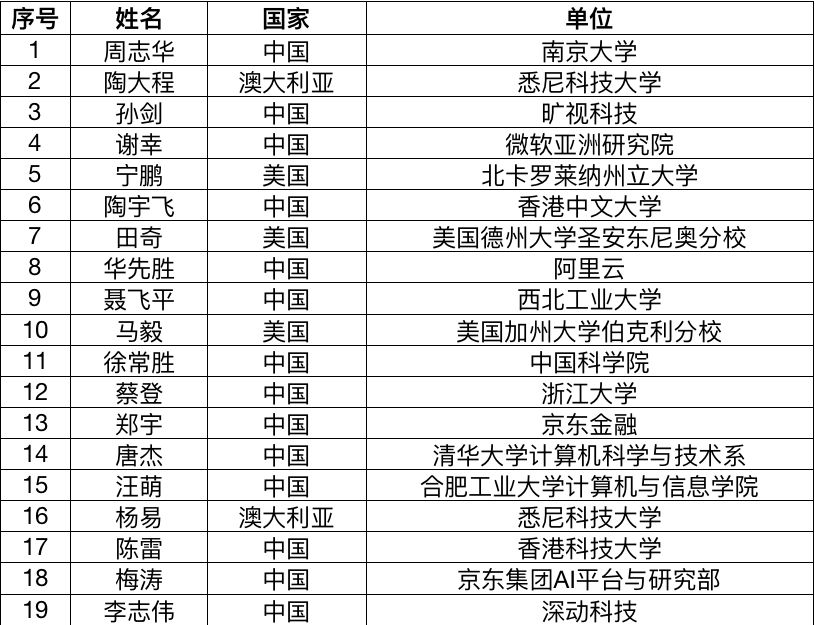
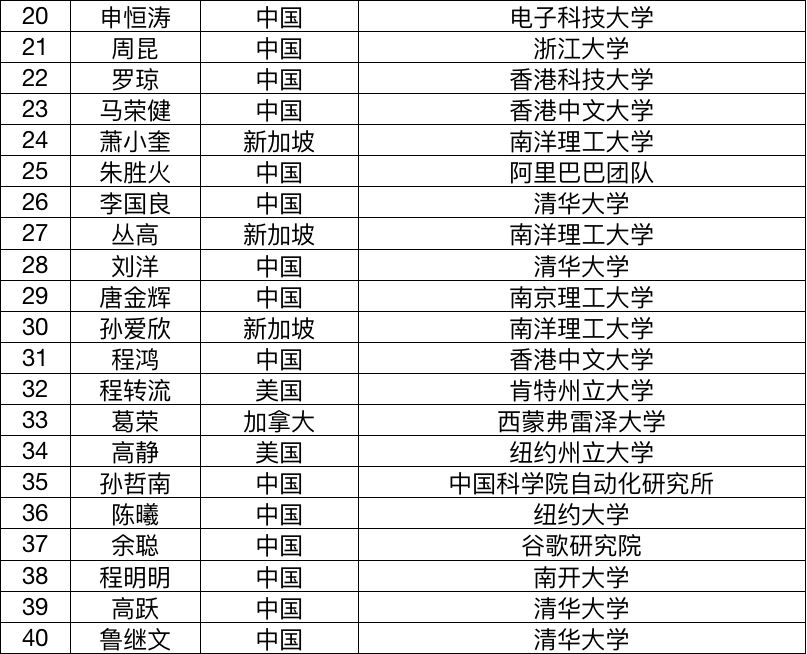
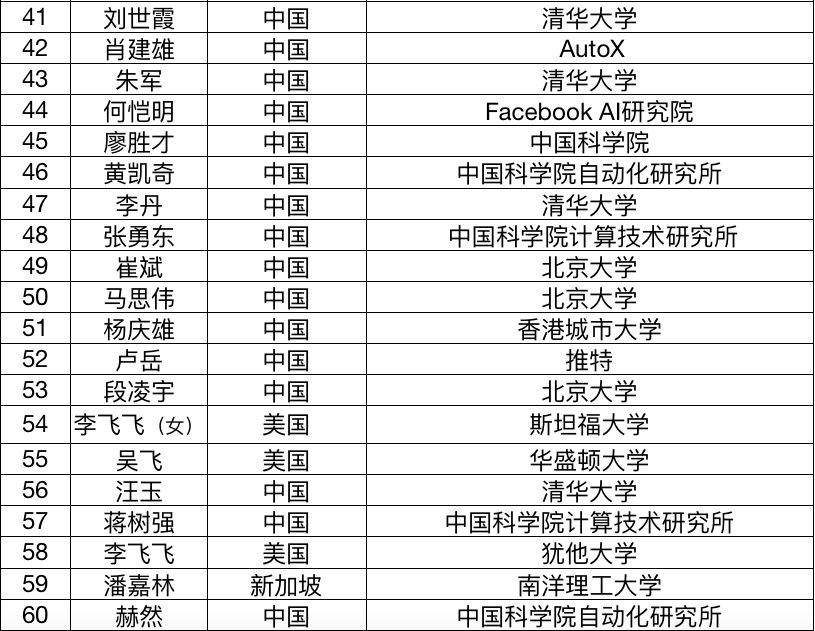
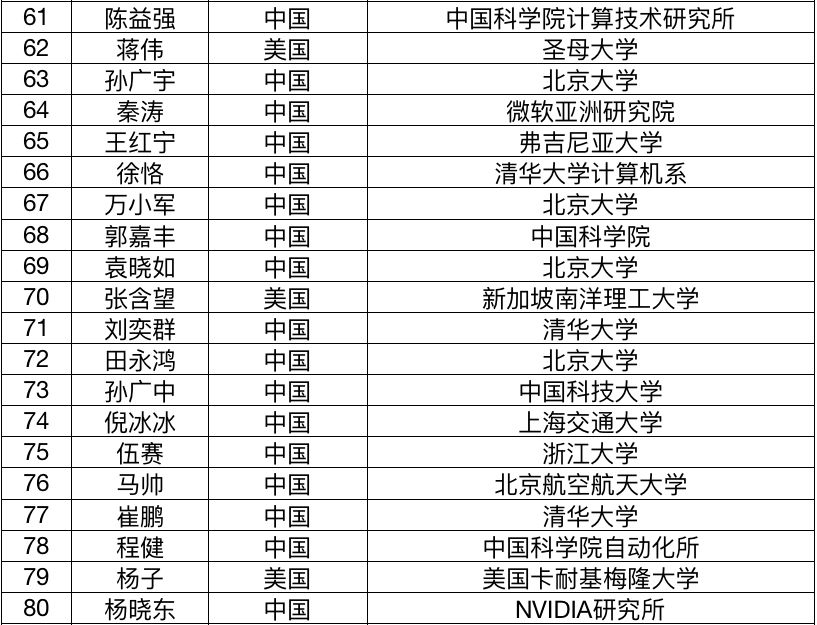
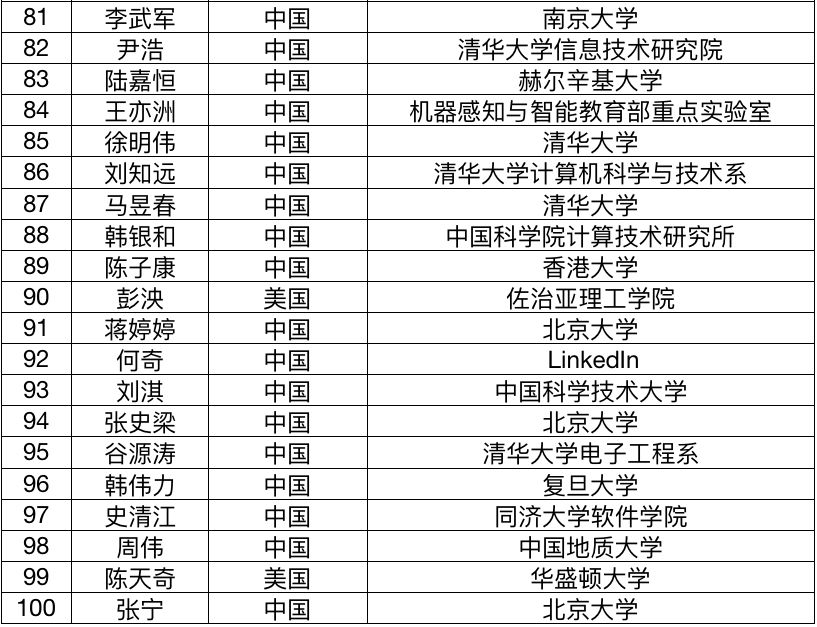

熱門頭條新聞
- Announcing FMX 2025: Rhythm of Change
- Detective Mystery Game Detective Dotson Announces Animated Film
- DISCOVER WHAT LIES BEYOND THE DOORS OF THE SOMNIUM LABYRINTH IN WUTHERING WAVES UPDATE WHEN THE NIGHT KNOCKS COMING SOON
- The global GPU market is worth almost $100 billion.
- Submissions for 2025 Films are Open–ANNECY 2025
- Victura Introduces the World’s First Documentary Video Game
- Marvel Rivals Unveils Moon Knight Set to Join Launch Roster of All-Star Characters on December 6th
- A global business space for Latin American Animation projecting itself to the world
